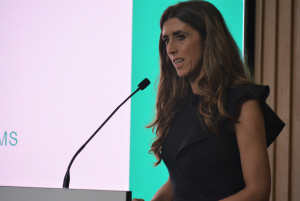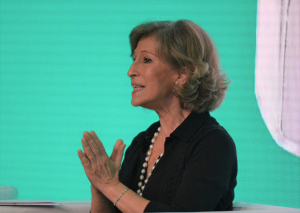A study coordinated by CINTESIS researchers shows that, after changing eating habits, it takes only 12 weeks to reduce salt intake and to lower blood pressure, a major risk factor for brain and cardiovascular disease.
The main conclusions were presented at the World Food Day in Lisbon by its coordinators, researchers Conceição Calhau, from CINTESIS / Nova Medical School, and Jorge Polónia, CINTESIS / Faculty of Medicine of the University of Porto.
The ReEducar – Healthy Eating Reeducation study aimed to reduce salt intake. About 300 adult were selected as volunteers out of 1500 registered applications. The strategies consisted in promoting food literacy and lifestyle changes through face-to-face training sessions and follow-up over a 12-weeks intervention. During this period, several clinical assessments were carried out, including 24-hour blood and urine measurements and waist circumference measurements.
 One of the first results points to a favorable change in dietary patterns. “There is a lot of confusion and misinformation in terms of food. We seek to provide skills in this area. In 12 weeks, there was an increase in the consumption of vegetables, fruits, legumes and fish. That is, in the end, we have a greater adherence to the Mediterranean food standard. It also reduces the consumption of processed meats and snack foods,” said researcher Conceição Calhau.
One of the first results points to a favorable change in dietary patterns. “There is a lot of confusion and misinformation in terms of food. We seek to provide skills in this area. In 12 weeks, there was an increase in the consumption of vegetables, fruits, legumes and fish. That is, in the end, we have a greater adherence to the Mediterranean food standard. It also reduces the consumption of processed meats and snack foods,” said researcher Conceição Calhau.
This favorable change in diet led to a reduction in salt intake, especially when salt was higher (up to 0.6 grams/day), an increase in potassium intake, a reduction in sodium/potassium ratio, a reduction in blood pressure of 2,1 mmHg on average and 9 mmHg in individuals with higher blood pressure. There was also a decrease in waist circumference, especially in obese and higher risk women.
“The idea is not only to reduce sodium-rich foods, which is the “villain”, but also to increase potassium-rich foods, which is protective. The lower the sodium/potassium ratio, the better for health,” said Jorge Polónia, noting that the PHYSA study, also coordinated by him, showed that the Portuguese consume about 10 grams/day of salt, i.e. twice of what is recommended by the World Health Organization (WHO)
With regard to blood pressure, the expert noted that “a reduction of only 2 mmHg allows a significant reduction in the risk of stroke, coronary disease and death. This is a key public health intervention. We are far from what would be the desired level, but we are on the right track to reducing cardiovascular mortality. ”
As he stressed, “All therapeutic interventions should start with changes in lifestyles and only then use medications, when needed. The nutritional intervention is preventive and therapeutic ”.
Other CINTESIS researchers participated in this session, namely André Rosário, who explained the design of the ReEduca study, and Carla Rêgo, who intervened in the debate, alongside Conceição Calhau and Jorge Polónia.
For researcher and pediatrician Carla Rêgo, “a healthy diet in the first 1000 days of life, or rather, the first 1100 days, if we include the last trimester of pregnancy, is crucial.” 
The expert, who presented, on the same day, the Manual “Alimentação Saudável dos 0 aos 6 anos – linhas de orientação para profissionais e educadores” (“Healthy Eating from 0 to 6 years – guidelines for professionals and educators” , advocated the “co-responsibility of educators and parents of children”, as well as schools, for their role directly or indirectly in the food choices of the young.
While acknowledging that “salt has been more politically difficult to work with”, Conceição Calhau also admits that other measures may be coming soon, notably the commitment of the bakery industry to a salt reduction of 1,4 grams of salt per 100 grams of bread to 1 gram of salt per 100 grams of bread.
Jorge Poland also advocated a change in tax policy that rewards healthy foods, considering that it is not enough to tax the so-called unhealthy foods.
Among the participants were, among others, Fernando Gomes, president of the Portuguese Football Federation; Jaime Branco, director of the Faculty of Medical Sciences of the Nova University of Lisbon, Germano de Sousa, of the Germano de Sousa Group; Fernando Pádua, a pioneer cardiologist in raising awareness of the need to reduce salt; Salvador de Mello, Chairman of the Board of Directors of José de Mello Saúde; and Pedro Soares dos Santos, Chairman of the Board of Directors of Jerónimo Martins.
The ReEducar study is part of the program “Menos Sal Portugal” (Less Salt Portugal), promoted by CUF and Pingo Doce.

